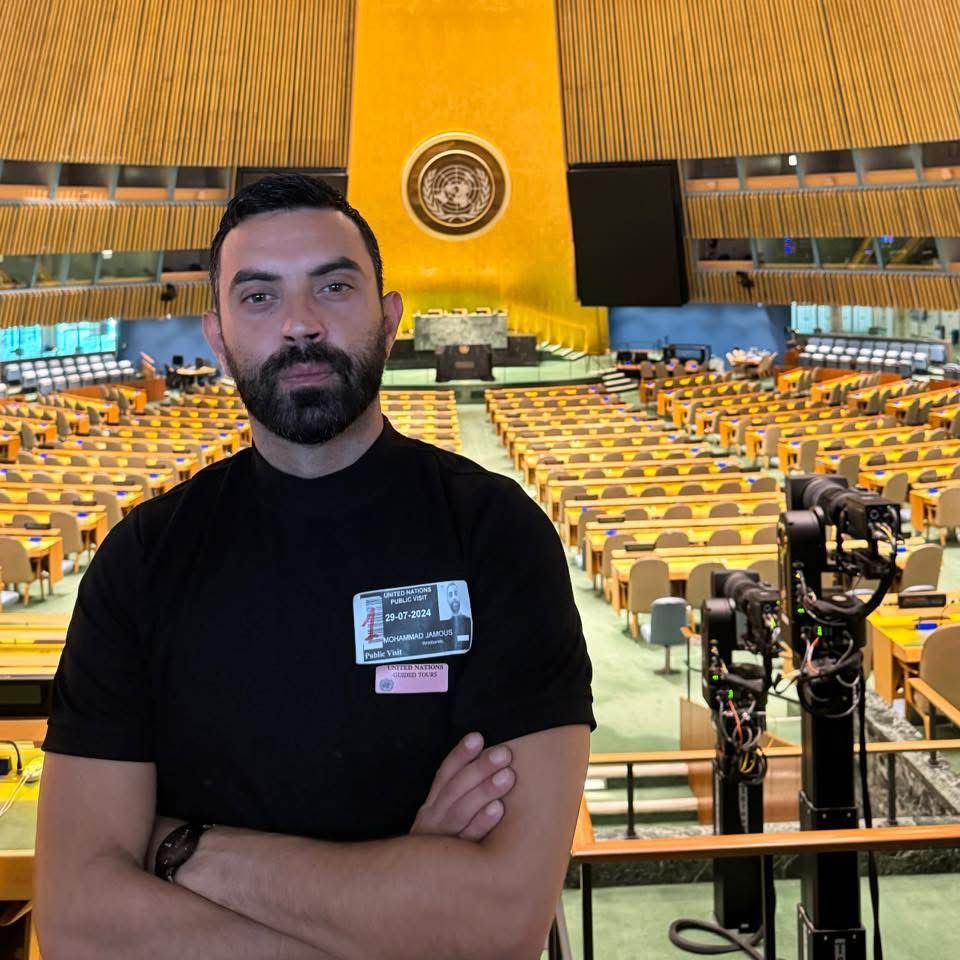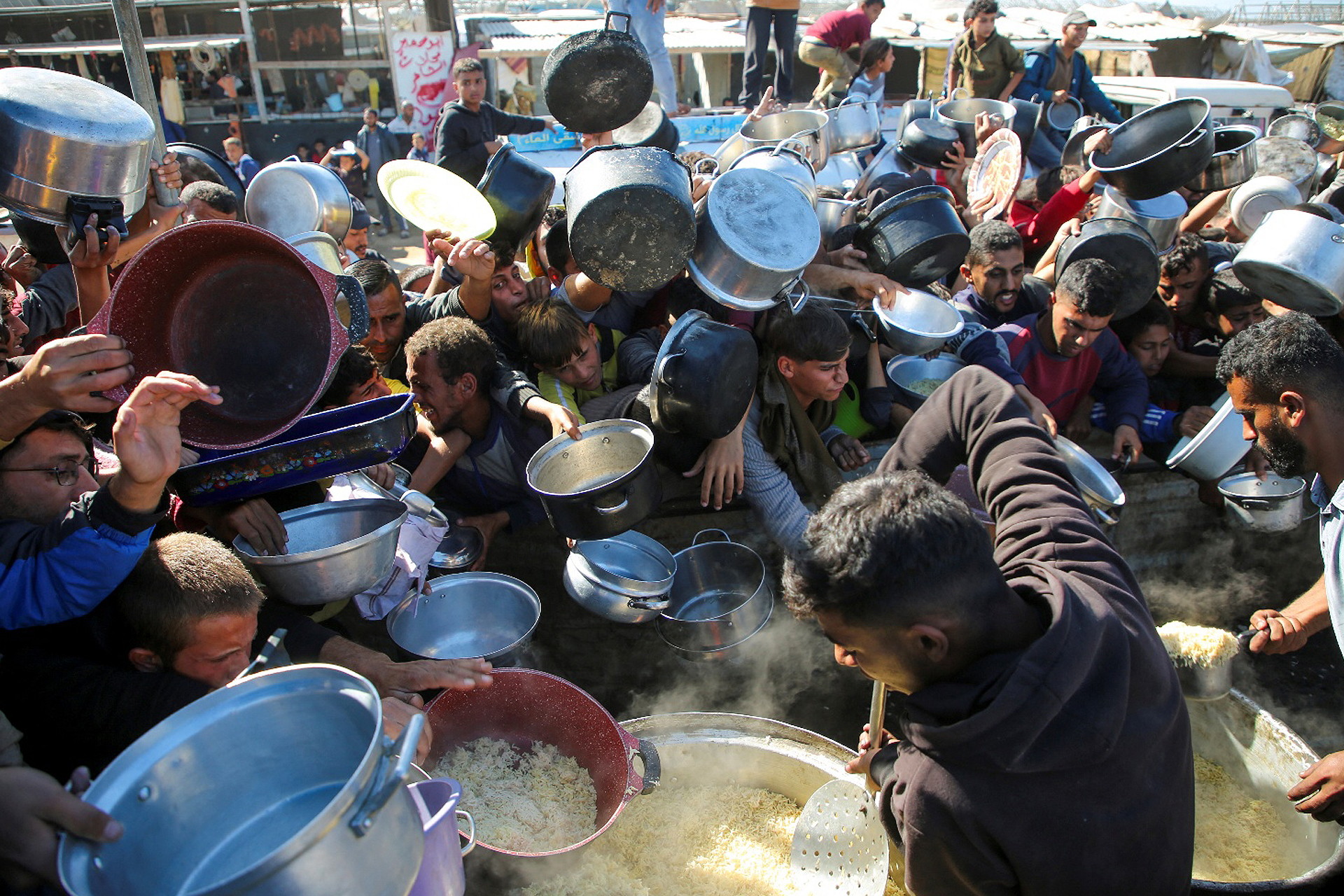In January 2020, when Qassem Soleimani, commander of Iran’s Al-Quds Force, was killed by a U.S. drone strike, I was still in Gaza. Within hours, Hamas officials declared public mourning. Banners were printed and hung throughout Gaza City. One of the largest mourning tents was raised in Al-Saraya Square, just a short walk from my home in the Al-Remal neighborhood. Soleimani’s face loomed from black flags that covered the walls, flanked by slogans naming him
*Shaheed al-Quds*—the martyr of Jerusalem. I remember watching Ismail Haniyeh’s speech from abroad, in which he repeated that title three times, not as a eulogy, but as a declaration of ideological loyalty to Tehran. To many of us in Gaza, the display was offensive but also clarifying. Soleimani was not a Palestinian figure. He was a foreign general, the architect of Iran’s network of militias, and the man responsible for enabling the police-state mechanisms that rule over Gaza.
One young man, in protest, tore down a poster. Hamas identified him and arrested him within hours. His act was not treated as vandalism but as treason against an imported doctrine. This pattern has not changed. In May 2024, when Iranian President Ebrahim Raisi and Foreign Minister Hossein Amir-Abdollahian died in a helicopter crash, the response in Gaza was once again dictated by fear rather than by grief.
Although many Gazans were starving, displaced, and under bombardment, Hamas still managed to arrest civilians who had distributed sweets or posted jokes online. Even in war, the Hamas regime found time to protect Iran’s honor before protecting its own citizens. I know this system well.
I was imprisoned and tortured twice by Hamas for political dissent. My “crime” was refusing to remain silent about the authoritarian grip the group held over Palestinian life. The interrogations, the beatings, and the attempts to strip me of dignity were all designed to enforce obedience, not to address security. My family has paid the price too.
After Hamas carried out the terrorist atrocities of October 7—an operation driven by regional confrontation and ideological fanaticism rather than any coherent national strategy—my relatives fled to Egypt. Our home in Gaza was later destroyed in the war that has followed.
That war, like the attack that provoked it, had nothing to do with protecting Palestinian lives or advancing the cause of liberation. It served as one more chapter in a foreign agenda that uses our suffering as strategic leverage. Today, my family remains in limbo. There is no path forward and no safe return.
The relationship between Hamas and the Islamic Republic of Iran is not circumstantial or symbolic. It is structural and hierarchical. Over the past decade, Hamas’s political leadership has visited Tehran more often than they have visited Gaza. During this current war, as various ceasefire proposals were drafted, Hamas leaders delayed responding until they had flown from Doha to Tehran to consult with Iranian officials. It was not the terms of the truce, nor the humanitarian toll of the conflict, that mattered most. What mattered was whether the proposal aligned with Iran’s regional objectives.
**No one elected the Ayatollah, yet he decides our fate. Iran’s role in Hamas’s evolution began long before this war.
Since the 1980s, the Islamic Republic has invested in Islamist factions that oppose any negotiated solution with Israel. When the Madrid Conference launched in 1991 and when the Oslo Accords were signed in 1993, Tehran responded by funding and arming rejectionist actors. Hamas and Palestinian Islamic Jihad became the primary beneficiaries of this strategy. Suicide bombings, rocket attacks, and political assassinations were not random responses to occupation. They were deliberate efforts to derail diplomacy and destroy any alternative to armed struggle. For Iran, Palestinian suffering was not a problem to be solved, but a tool to exploit. Hamas has consistently served this purpose.
The 2007 coup in Gaza, in which Hamas violently overthrew the Palestinian Authority, was a strategic victory for Tehran. Backed financially, militarily, and ideologically by Iran, Hamas established a parallel regime in Gaza—a one-party security state built not to represent Palestinians, but to enforce a doctrine imported from abroad. Since then, Gaza has functioned less as a territory in need of governance than as a theater of confrontation in Iran’s wider conflict with Israel and the West.
What Hamas built in Gaza is a proxy state modeled on Iran’s theocratic surveillance systems and governed through repression. Political dissent is not tolerated. Elections have not been held in over 15 years. Reconciliation with the Palestinian Authority has been repeatedly undermined. Technocratic alternatives, civil society initiatives, and popular protests have been crushed with the same rhetoric Hamas once used against Israel. Gaza has been kidnapped, not liberated.
Inside this system, fear is total. Yahya Sinwar’s was directly replicating a security apparatus modeled directly on Iran’s Islamic Revolutionary Guard Corps. The group’s General Security Service, operating under Sinwar’s command, developed a secret surveillance network of over 850 agents tasked with identifying “ideological deviations.”
Thousands of civilians had files opened on them. Journalists, activists, youth organizers, and even devout Muslims were targeted for private behavior, moral “violations,” or suspicion of political disloyalty. Informants were embedded in neighborhoods. Phones were tapped. People learned to whisper—to weigh every sentence.
This internal repression has been one of Iran’s most successful exports. Gaza is now governed according to a model that prizes control over consensus, militarism over governance, and slogans over solutions. Even in the distribution of aid, Hamas has prioritized ideological loyalty. Humanitarian assistance is weaponized. Dissenters are punished.
A siege from within.
The consequences are not only local. Over the past 15 years, the Palestinian cause has lost its diplomatic legitimacy on the international stage. Most serious governments no longer engage meaningfully with the Palestinian leadership, not because the issue is unimportant, but because the leadership itself has become unserious. No state will negotiate with a faction that openly rejects peace, aligns with a foreign theocracy, and builds its strategy around perpetual war.
What remains of Palestinian diplomacy is now fractured, stagnant, and seen—rightfully—as an extension of regional proxy conflicts. Our suffering is no longer understood as the result of statelessness or occupation alone.
Increasingly, it is viewed as a symptom of Iran’s broader war with the West. The Palestinian people have become collateral in this war. If the world is serious about Palestinian rights, it must stop treating Hamas as a legitimate actor. The group does not speak for Palestinians. It speaks for its own patrons. It does not protect us. It uses us. Its loyalty is not to Gaza, but to a regional axis that views Palestinian blood as an expendable asset in its campaign for regional power. I lost my home to this ideology. I lost friends to its prisons.
My family is now displaced because of it. I know what it means to stand against Hamas, not as an enemy of resistance, but as someone who believes that resistance must serve the people—not a foreign capital.
What Gaza needs is not more slogans. It needs political oxygen. It needs institutions that serve its people. It needs to be freed from those who claim to fight for it while holding it hostage. The future of Palestinians must no longer be authored in Qom or Doha. It must be reclaimed—in Gaza, in Ramallah, and wherever Palestinians still believe in the possibility of political dignity unchained from imported war.
The future of Palestinians must no longer be dictated from Qom or Doha. It must be reclaimed—in Gaza, in Ramallah, and wherever Palestinians still dare to imagine a real future, free from the shackles of someone else’s war.
Until we sever the chain to Tehran, Palestinians will remain prisoners of a foreign regime. No peace plan can succeed until Palestinians reclaim the right to speak for themselves—without permission from Tehran.






.JPG)



